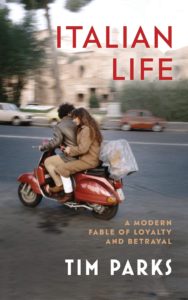 What’s in this book? The fruit of forty years in Italy. But not written up as memoir. I’ve been that way before. Italian Neighbours. Italian Ways. I know the charm of the candid personal account, the bemused observer discovering Italy first hand. It’s fun. It has its authenticity. But after so long in this country, one wants to go deeper: get to the core of it, the pattern that underlies both the good and the bad, the wonderful human warmth of the place, its systematic cruelty.
What’s in this book? The fruit of forty years in Italy. But not written up as memoir. I’ve been that way before. Italian Neighbours. Italian Ways. I know the charm of the candid personal account, the bemused observer discovering Italy first hand. It’s fun. It has its authenticity. But after so long in this country, one wants to go deeper: get to the core of it, the pattern that underlies both the good and the bad, the wonderful human warmth of the place, its systematic cruelty.
We are told again and again that human experience is essentially the same the world over. Happiness. Suffering. It is not true. Or only in part. You don’t need to be long in Italy, looking for a job, sorting out your documents, dealing with your in-laws, colleagues, bank tellers, waiters, ticket inspectors, to understand that people behave differently here, expect different things of each other. But it takes many years to understand that they also rejoice differently, are sad in different ways, over different dramas.
You realise this when you notice your own emotions shifting. It would be strange and rather depressing if I had not become to some degree Italian in my many years here. At this point you want to bring in other stories not strictly connected to your own. You want to make sense of it. And you feel you have the right. You have begun to understand the emotion of the young southerner in the north, the pride of the padrino who finds jobs for all his friends, the shame of feeling yourloved ones are unworthy, the resentment of the child who is excluded. You know what it’s like to be asked to pay a bribe, and the consequences of refusing, or agreeing. You hear others tell their stories and at last you see what’s at stake.
In short, this book has a richer dramatis personae than my other writing on Italy, so that the Italian comedy, divine or demonic, can be acted out. It does not restrict itself to what has been directly experienced. It’s true, there is an Englishman among the many Italians. He has a central role. Readers may feel that’s Parks, there he is. But I have taken the liberty of giving this man many experiences that are not mine. Sometimes the only way to pack a book with life is to superimpose one thing on another, fuse characters together, put imaginary situations and people side by side, so they can call to each other, and the reader can hear them calling. None of the characters described here are to be taken as portraits of this or that real life person.
Those odd stories we call myths and fables invite us to move into a new world of feeling, where everything is strange, but also strangely convincing. I am inviting you now to plunge into an Italian fable, to discover a new emotional landscape and become yourself, if only
momentarily perhaps, in the final climactic pages, Italian.
